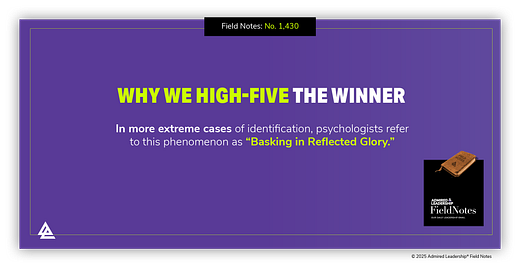Perhaps it’s because people hope excellence will rub off and carry them to their own success. Or maybe it’s because the more success they share in, the better people feel about themselves.
Whatever the reason, spectators, fans, and colleagues like to physically acknowledge achievement. To share in the celebration, they hand-slap, high-five, fist pump, and chest bump with the winner or champion.
These gestures are a way of congratulating the achiever for their hard work, dedication, and success. They convey a positivity and excitement that show camaraderie and connection.
The association they feel with the champion is galvanized by the physical display. The physical reinforcement brings the champion and those who support them closer together, fostering a sense of community achievement that both share.
By acknowledging the winner with a physical display of congratulations, people send the message to others that they stand for excellence and share in the joy it produces.
For some people, the identification they feel is so strong as to enhance their self-esteem and sense of identity. They feel pride in the achievement as if they were a part of the success.
In more extreme cases of identification, psychologists refer to this phenomenon as “Basking in Reflected Glory.” It is especially prevalent among the most passionate and devoted fans and supporters.
Despite not having any direct role in the champion’s success, those who strongly identify with the winner can come to feel as if their support was central to their success. So much so that they can perceive themselves as worthy of acknowledgment and congratulations as well.
In athletic or team competition environments, people with modest identification are more likely to display visible associations, like wearing team apparel, to showcase their support.
In the workplace, the visible displays are typically limited to congratulating with physical gestures or seeking time and attention with the achievers.
But when the identification with the achiever is heightened, spectators or colleagues can sometimes seek credit from peers and leaders for the winner’s success.
Displaying happiness for the success of others is what good people do. Doing so physically on occasion is both natural and affiliative.
But building self-esteem from the victories of others is a bridge too far. It is better for you to create your own success than to live vicariously through the victories of others.
Keep the jersey and the fist pump. Jettison the need to take credit for the success of others, especially achievers or champions you have no real relationship with.





There's often a deeper meaning and reason behind this within the team itself. In my experience in college baseball, we called it "picking each other up." That congratulatory energy was more a celebration of the collective perseverance than anything. We had a saying we lived by: "Get the next one." This meant that, because baseball is a game of failure, our mindset was always to wipe the slate clean and give our best attitude and effort on the next play. Learn from the mistake so as not to repeat it and move on. So, the biggest congratulatory displays were not celebrating someone with repeated success; it's when someone has been struggling and breaks out of that slump.
This is sort of an adjacent thought to your main point, but it's where my mind went when reading this. Thanks for sharing!